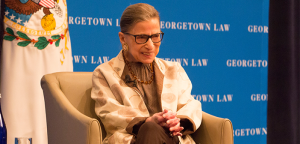
Supreme Court Justice Ruth Bader Ginsburg addressed first-year law students at the Georgetown University Law Center on Thursday, highlighting her time with the late Justice Antonin Scalia.
Supreme Court Justice Ruth Bader Ginsburg addressed first-year law students Sept. 7 at the Georgetown University Law Center before opening the floor up to questions from the audience, paying tribute to her late colleague Justice Antonin Scalia (CAS ’57) and reflecting on her commitment to gender equality throughout her career.
In his introduction of the justice, GULC Dean William M. Treanor praised Ginsburg — who has served on the Supreme Court for nearly 23 years — for championing social change and gender equality.
“She occupies a rare space in legal history. Like Justice Thurgood Marshall, Justice Ginsburg would’ve been a historic figure in her case for her work as an advocate for gender equality — she would’ve been a historic figure even if she’d never been a judge,” Treanor said.
Ginsburg has long had a relationship with GULC, where her husband was a longtime member of the faculty until his death in 2010. She spoke to the graduating class of 2015 in February and again at an alumni event in May.
Ginsburg opened the program Thursday by remembering Scalia, who died in October 2015, highlighting the ways in which he influenced her while they worked together on the D.C. Circuit of the U.S. Court of Appeals and for her entire tenure in the Supreme Court, prior to his death.
“Indeed whenever I wrote with the court and received a Scalia dissent, the majority opinion ultimately released was clearer and more convincing than my original circulation. Justice Scalia honed in on all the soft spots and energized me to strengthen the court’s decision,” she said.
Ginsburg discussed Scalia’s caring nature throughout their friendship, sharing an anecdote from the Bush v. Gore decision, which ruled in favor of George W. Bush in his disputed victory during 2000’s presidential election. Scalia concurred with the majority opinion while Ginsburg wrote a dissent.
“I was in chambers, exhausted after the marathon. Around 9:00 p.m. on Tuesday night, the telephone, my direct line, rang. It was Justice Scalia. He didn’t say, as he often did, ‘Get over it.’ Instead he asked, ‘Ruth, why are you still at the court? Go home and take a hot bath,’” Ginsburg said.
Ginsburg further reflected on the two justices’ unlikely friendship and collegiality.
“Among my favorite Scalia stories — when President Clinton was mulling over his first nomination to the Supreme Court, Justice Scalia was asked a question to this effect: ‘If you were stranded on a desert island with your new court colleague, whom would you prefer, Larry Tribe or Mario Cuomo?’ Scalia answered without hesitation, ‘Ruth Bader Ginsburg,’” Ginsburg said.
Despite their glaring ideological differences, the two were famously close friends.
“Once asked how we could be friends given our disagreement on lots of things, Justice Scalia answered: ‘I attack ideas, I don’t attack people,’” Ginsburg said. “Some very good people have some very bad ideas, and if you can’t separate the two, then you’ve got to get yourself another day job.”
Ginsburg went on to praise Scalia’s work ethic and personality, sharing details about their time together as colleagues and friends.
“I miss the challenges and the laughter Justice Scalia provoked. His pungent, eminently quotable opinions, so clearly stated that his words rarely slip from the reader’s grasp, the roses he brought me on my birthday,” Ginsburg said. “The court is a paler place without him.”
After speaking about Scalia, Ginsburg shifted her speech to a conversation on her advocacy efforts for gender equality as an attorney, such as discrimination in the workplace, unpaid maternity leave for teachers without right of return and lack of family insurance coverage for blue collar women.
“It dawned on me how lucky I was to be born when I was and to be a lawyer, because it was the first time in the history of the United States that it became possible for legislators and judges to respond to the arbitrary gender lines,” she said. “Whatever we were saying in the 70s had been said generations before, but said at a time when society was not yet ready to listen.”
The event concluded with a question-and-answer session for first-year law students, during which Ginsburg was asked if she believes there has been substantial progress in gender inequality issues, particularly in law.
“I am amazed at how quick the progress has been. I think back to the days when I was one of nine women students in an entry class of over 500,” Ginsburg said. “The direction of change is right. Sometimes people ask me, ‘So now there are three of you, when do you think you’ll have enough women in the Supreme Court?’ and I think, frankly, at nine.”
Ginsburg further lauded the strides made in gender inequality issues in her career, but called attention to the difficulties of balancing a career and home life as a working mother along with the unconscious biases that still prompt discrimination in the workplace.
Whitney Greer (GRD ’19) said she found Ginsburg’s friendship with Scalia to be poignant in an era brimming with political discord.
“It was a very valuable topic of conversation because she stressed the importance, particularly in law, which is sort of fundamentally a conflict-based profession, about maintaining professional and personal relationships aside from political conflict. And even as we have polarizing views, the importance of still recognizing the humanity in another person and still valuing them and their opinions,” Greer said. “I thought it was great she used this platform to honor him that way.”
In his comments, Treanor underscored Ginsburg’s influence in everyday culture.
“The justice is a cultural icon. How many of us can say that they have inspired a one-act opera, two coloring books and the phenomenon known as the Notorious RBG?” Treanor said.




















